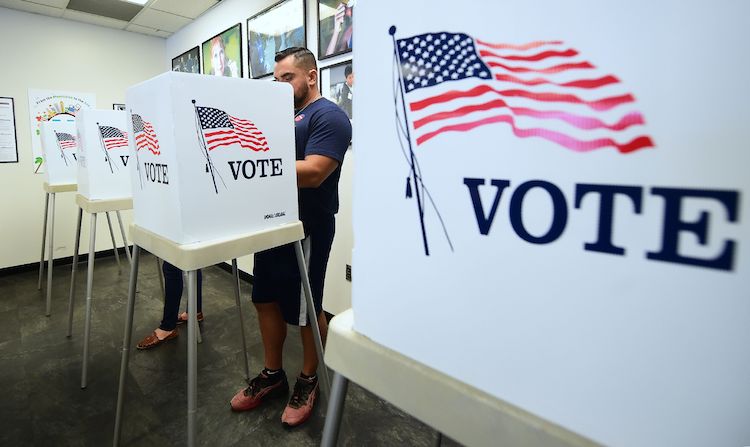In 'catastrophic' ruling for minority voters, 8th Circuit says only US can sue for discriminatory voting practices

Voters cast their ballots for early voting in California on Nov. 5, 2018. Politico reports that if a recent ruling by the 8th U.S. Circuit Court of Appeals at St. Louis stands, “it would mark a dramatic rollback of the enforcement of the law that led to increased minority power and representation in American politics.” Photo by Frederic J. Brown/AFP via Getty Images.
The 8th U.S. Circuit Court of Appeals at St. Louis ruled Monday that private plaintiffs cannot sue for alleged violations of Section 2 of the Voting Rights Act, which bans voting practices and procedures that deny or abridge the right to vote on the basis of race or color.
The “catastrophic” 2-1 decision would allow the U.S. attorney general, but not private groups, to sue under Section 2, according to Democracy Docket, a publication founded by lawyer and Clinton campaign general counsel Marc Elias.
The appellate ruling upholds a decision by U.S. District Judge Lee P. Rudofsky of the Eastern District of Arkansas.
Politico reports that if the ruling stands, “it would mark a dramatic rollback of the enforcement of the law that led to increased minority power and representation in American politics.”
Other publications with coverage include Bloomberg Law, the New York Times, the Election Law Blog (here and here) and NPR.
Sophia Lin Lakin, director of the American Civil Liberties Union’s Voting Rights Project, had argued the 8th Circuit appeal on behalf of the plaintiffs, the Arkansas State Conference of the NAACP and the Arkansas Public Policy Panel. They were challenging a redistricting plan for the Arkansas House of Representatives.
“This ruling is a travesty for democracy,” Lakin said in an ACLU press release. “For generations, private individuals have brought cases under Section 2 of the Voting Rights Act to protect their right to vote.”
No court had denied plaintiffs the ability to sue in federal court—until rulings in this case, she said.
Judge David R. Stras, an appointee of former President Donald Trump, wrote the majority opinion. He said the Voting Rights Act lists only one plaintiff who can enforce Section 2, and that person is the U.S. attorney general. There is no basis in the “text, history and structure” of the Voting Rights Act to allow lawsuits by private parties, he said.
Arkansas Attorney General Tim Griffin, a Republican, praised the ruling, according to Politico.
“For far too long, courts across the country have allowed political activists to file meritless lawsuits seeking to seize control of how states conduct elections and redistricting,” Griffin said. “This decision confirms that enforcement of the Voting Rights Act should be handled by politically accountable officials and not by outside special interest groups.”
The 8th Circuit ruling conflicts with a decision earlier this month by the 5th Circuit at New Orleans, which found that there is a private right of action under Section 2.
The circuit split makes it “almost inevitable” that the U.S. Supreme Court will weigh in, according to a post at the Election Law Blog by Rick Hasen, a professor at the University of California at Los Angeles School of Law. Justices Neil Gorsuch and Clarence Thomas have endorsed the theory that there is no private right of action.
The question, Hasen said, is whether “there will be three more.”
But Lakin told Bloomberg Law that the plaintiffs haven’t decided what they will do next. They could seek en banc review, could ask the Supreme Court to hear the case, or could file a new challenge to the map based on a different provision of the law.
The case is Arkansas State Conference NAACP v. Arkansas Board of Apportionment.
Write a letter to the editor, share a story tip or update, or report an error.



